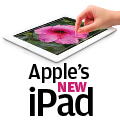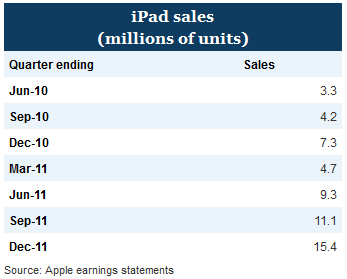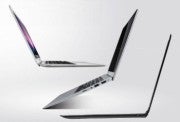 Tablets, and the iPad in particular, are part of the perfect storm hitting top PC makers; can Ultrabooks boost the competition?
Tablets, and the iPad in particular, are part of the perfect storm hitting top PC makers; can Ultrabooks boost the competition?
With the unveiling of Apple's latest iPad on Wednesday, PC makers must accelerate efforts to keep the tablet from taking a bigger slice of their business.
Some of the top PC players are already struggling.
Hewlett-Packard, the world's biggest PC maker, saw its profits plunge in its first fiscal 2012 quarter as consumers, and even enterprises, were already looking more closely at replacing or augmenting PCs with cool tablets.
Now Apple has upped the ante with a new iteration of the world's most popular tablet.
"The iPad is cutting into PC sales and PC companies really won't have a strong response until Windows 8 ships later in the year. So they have every reason to be concerned," said Rob Enderle, an analyst at the Enderle Group.
"[Tablets are] clearly having a sharp impact on [PC] growth. While they don't truly replace a PC, folks who buy an iPad typically hold off on buying a new PC. And more frightening, is that when they do buy, they appear to be trending towards Apple products," Enderle added.
 During the unveiling event Wednesday in San Francisco, Apple officials said the new iPad will be faster than its predecessor and have a considerably higher resolution screen.
During the unveiling event Wednesday in San Francisco, Apple officials said the new iPad will be faster than its predecessor and have a considerably higher resolution screen.PC makers like HP, Dell and Lenovo must be drooling with envy over the kind product anticipation and feverish buying that came before and after yesterday's event.
The PC market could use a shot in the arm as PC growth continues to slow. In the third quarter of 2011, for instance, the overall PC market grew by only 5.5%, according to a report from IHS iSuppli.
HP cited plunging PC and printer sales when it disclosed late last month that its profit plunged 44% in the quarter ended Jan. 31, and Dell said its first quarter profit declined by 18%.
Industry analysts say it's going to take a lot of work for HP to get back on track. "Tablets are a part of HP's pain but only a small part," said Charles King, an analyst at Pund-IT, Inc. "Two plus years of disarray in the company's leadership is a more fundamental issue."
While analysts generally agree that HP's wounds are mostly self-inflicted, the popularity of tablets like the iPad isn't going to help the PC leader or its traditional rivals convince users to refocus on laptop and desktop computers.
"The iPad is having an effect on the PC business, for sure, but the magnitude isn't clear at all," said Dan Olds, an analyst at Gabriel Consulting Group. "For most iPad users, the iPad isn't their only computing device.
"The iPad is a new category," Olds added. "It's more than a smartphone but not quite a laptop. It can't handle the same tasks as a fully featured laptop, but for many things it's the perfect tool."
Though tablets can't yet fully replace full-featured laptops with bigger screens, more power and full-size keyboards, they are distracting user attention and money from the PC business, Olds said.
 The new Intel-based Ultrabooks that emerged en masse at the Consumer Electronic Show early this year is a potential response to tablets, Olds noted.
The new Intel-based Ultrabooks that emerged en masse at the Consumer Electronic Show early this year is a potential response to tablets, Olds noted."I think the Ultrabook effort is a step in the right direction," said Olds.
"The systems offer a lot of the iPad advantages -- small size, fast boot times, and long battery life. They also have features that iPads don't, like the ability to use the huge range of x86 PC software and the ability to store more files on your local system," he added.
"For business users," Olds said, "the addition of a normal keyboard is typically also seen as an advantage. The main roadblock for Ultrabooks is probably price, which hovers near $1,000."
Ultrabooks also pose a problem for PC makers. While they may attack the tablet market, they could also cannibalize laptops.
Analysts note that PC makers must aggressively compete with tablet makers to build a lightweight mobile device that is powerful, can run the software users want most, and offers a long battery life.
"Mobility seems to be the major driving force in PC and notebook development, so increasingly light, powerful machines complemented by next-gen Intel and AMD CPUs will be a constant," said King.
"Touch screen technology in concert with Microsoft's Windows 8 could be a game-changer as well. All in all, 2012 and 2013 are shaping up to be interesting years for PCs," King added. LINK


